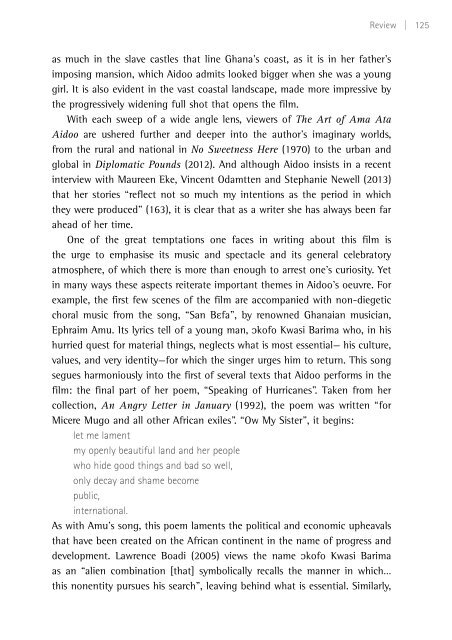Create successful ePaper yourself
Turn your PDF publications into a flip-book with our unique Google optimized e-Paper software.
as much in the slave castles that line Ghana’s coast, as it is in her father’s<br />
imposing mansion, which Aidoo admits looked bigger when she was a young<br />
girl. It is also evident in the vast coastal l<strong>and</strong>scape, made more impressive by<br />
the progressively widening full shot that opens the film.<br />
With each sweep of a wide angle lens, viewers of The Art of Ama Ata<br />
Aidoo are ushered further <strong>and</strong> deeper into the author’s imaginary worlds,<br />
from the rural <strong>and</strong> national in No Sweetness Here (1970) to the urban <strong>and</strong><br />
global in Diplomatic Pounds (2012). And although Aidoo insists in a recent<br />
interview with Maureen Eke, Vincent Odamtten <strong>and</strong> Stephanie Newell (2013)<br />
that her stories “reflect not so much my intentions as the period in which<br />
they were produced” (163), it is clear that as a writer she has always been far<br />
ahead of her time.<br />
One of the great temptations one faces in writing about this film is<br />
the urge to emphasise its music <strong>and</strong> spectacle <strong>and</strong> its general celebratory<br />
atmosphere, of which there is more than enough to arrest one’s curiosity. Yet<br />
in many ways these aspects reiterate important themes in Aidoo’s oeuvre. For<br />
example, the first few scenes of the film are accompanied with non-diegetic<br />
choral music from the song, “San Bɛfa”, by renowned Ghanaian musician,<br />
Ephraim Amu. Its lyrics tell of a young man, ᴐkofo Kwasi Barima who, in his<br />
hurried quest for material things, neglects what is most essential— his culture,<br />
values, <strong>and</strong> very identity—for which the singer urges him to return. This song<br />
segues harmoniously into the first of several texts that Aidoo performs in the<br />
film: the final part of her poem, “Speaking of Hurricanes”. Taken from her<br />
collection, An Angry Letter in January (1992), the poem was written “for<br />
Micere Mugo <strong>and</strong> all other African exiles”. “Ow My Sister”, it begins:<br />
let me lament<br />
my openly beautiful l<strong>and</strong> <strong>and</strong> her people<br />
who hide good things <strong>and</strong> bad so well,<br />
only decay <strong>and</strong> shame become<br />
public,<br />
international.<br />
As with Amu’s song, this poem laments the political <strong>and</strong> economic upheavals<br />
that have been created on the African continent in the name of progress <strong>and</strong><br />
development. Lawrence Boadi (2005) views the name ᴐkofo Kwasi Barima<br />
as an “alien combination [that] symbolically recalls the manner in which…<br />
this nonentity pursues his search”, leaving behind what is essential. Similarly,<br />
Review | 125


